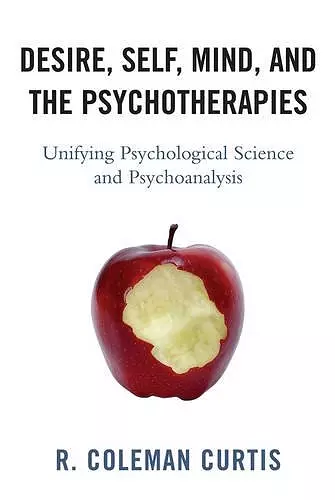Desire, Self, Mind, and the Psychotherapies
Unifying Psychological Science and Psychoanalysis
Format:Hardback
Publisher:Jason Aronson Publishers
Published:26th Sep '08
Currently unavailable, and unfortunately no date known when it will be back
This hardback is available in another edition too:
- Paperback£44.00(9780765705976)

Desire, Self, Mind, and the Psychotherapies unifies psychological science with contemporary relational psychoanalysis, arguing that the disciplines can be integrated if the concept of repression is understood as motivated forgetting, creative aspects of unconscious processes are taken into account in cognitive science, and a "new experiences" model of change is acknowledged by psychoanalysts. Such a model of change allows for integration of behavioral, cognitive, visual, and other techniques into a psychoanalytically-informed psychotherapy. This book will be of interest to mental health professionals, psychoanalysts, psychologists, and psychotherapists.
In this exceptionally readable and engaging book, Rebecca Curtis explains and integrates the clinically most useful and scientifically most tenable insights from relational psychoanalysis, cognitive and social psychology, and affective neuroscience. Much of existing psychoanalytic writing is words about words, speculative theories about prior speculative theories–bad poetry that meshes poorly with the growing body of empirical evidence in psychology and neuroscience. Curtis adroitly sidesteps or cuts through the accumulated verbiage and, without bias or rancor, offers a thoughtful, very wide-ranging, deeply anchored, and refreshingly realistic conception of desire, self, mind, and psychological transformation. The book will be extremely useful to both clinicians and researchers. -- Phillip R. Shaver, University of California, Davis
Rebecca Curtis' book represents what to my mind is the direction that psychoanalysis needs to take if it is to prosper and even survive. As Curtis points out in her book, psychoanalysis and psychology have existed in 'splendid isolation.' It is time to bring together and attempt to integrate findings and theories from these two different perspectives. Curtis, who is both an analyst and a psychologist and who has an impressive grasp of both fields, is well suited to make this attempt. She brings together in this book a vast array of material from psychology research and clinical psychoanalysis and theory. The reader will be stimulated and nurtured by this book. -- Morris Eagle
A solid resource for those studying psychology, counseling, human development, and related fields. Recommended. * CHOICE, May 2009 *
R. Coleman Curtis proposes a model of the mind and of therapeutic change that is intended to help provide a unifying foundation for psychoanalysis and physiological science….The book is clearly written, enjoyable to read, and offers a potentially integrative model designed to include the domains of the physical and the psychological as well as to provide concepts that are able to accommodate the perspectives of psychoanalysis and psychology. Curtis has given psychoanalysts and psychologists a very useful glimpse of the history of the ideas and biases that have shaped each field. * The International Journal of Psychoanalysis *
The insights and discoveries that derive from systematic empathic immersion in the experience of another person (particularly in the intimate bidirectional communications occurring in psychoanalysis and intensive psychotherapy) and the insights and discoveries deriving from controlled experiments, technological innovations in brain scanning, and other methods more conventionally thought of as 'scientific' have increasingly converged. But their literatures, terminologies, and theoretical formulations have tended to be quite separate, with proponents on one side of this divide largely ignorant of the contributions of the other. Curtis, in this far-ranging and scholarly work, seeks to heal this dissociation. Like both a good clinician and a good scientist, she attends to the data in ways that afford a fresh look. There is much to be learned from this important work. -- Paul L. Wachtel, distinguished professor of psychology, City University of New York at City College
It is an important work that brings up questions, some of which cannot be fully answered. Her clinical insight is matched by an incredible wealth of research to support her theory. She provides thoroughness of understanding as well as creative and unique contributions. Her understanding of many different aspects of research, theory, and history makes this book invaluable to the claim that psychoanalytic contributions must be understood if psychology is to stay relevant. * Psychoanalytic Psychology *
- Winner of Finalist for the Goethe Award (2009).
ISBN: 9780765705969
Dimensions: 239mm x 164mm x 25mm
Weight: 524g
276 pages